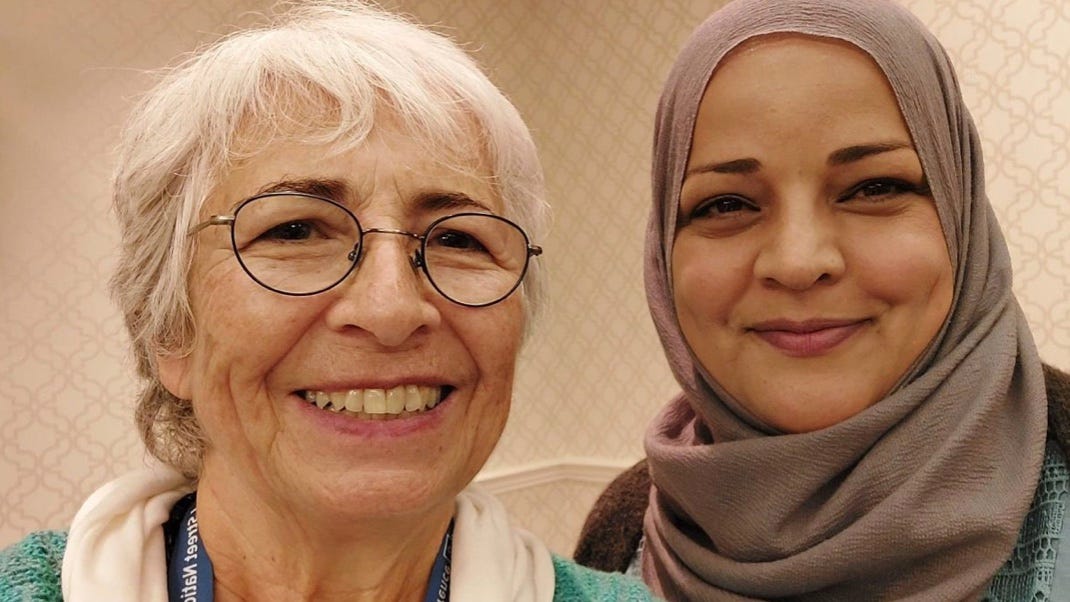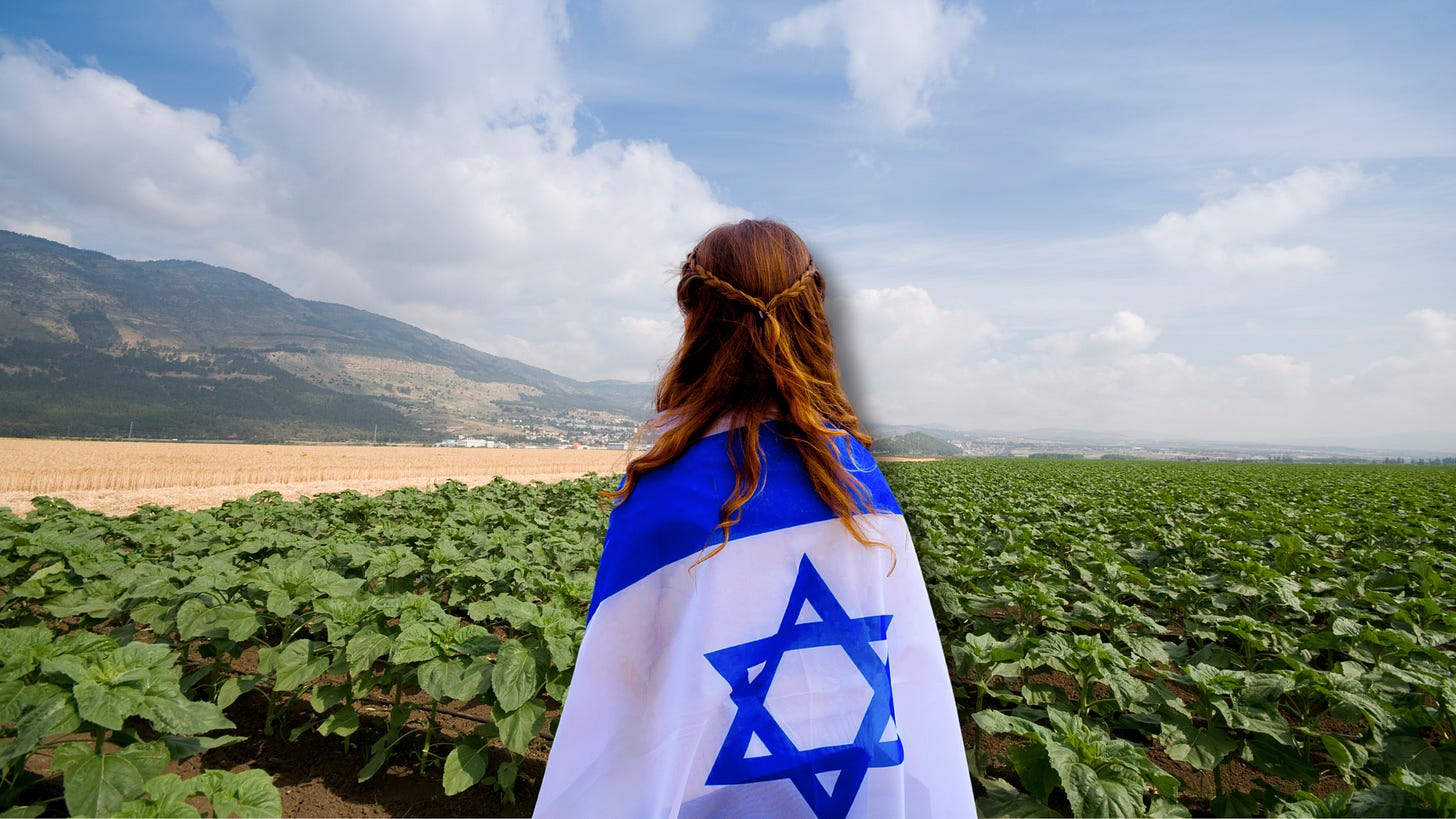Championing Hope in a Time of War
Plus, a tribute to Vivian Silver and the other Israeli peace activists who were either killed or kidnapped on October 7th.
Please consider supporting our mission to help everyone better understand and become smarter about the Jewish world. A gift of any amount helps keep our platform free of advertising and accessible to all.
You can also listen to the podcast version of this essay on Apple Podcasts, Google Podcasts, and Spotify.
Vivian Silver was a committed and fearless Arab-Jewish peace activist.
“A woman of infinite, deep, ongoing compassion, humanity, and dedication to Arab-Jewish partnership and peace,” said Israeli writer Anat Saragusti about Silver.1
Born in Canada, she eventually moved to Israel and lived some four kilometers (2.5 miles) from the Gaza Strip. Silver was the long-time director of the Arab-Jewish Center For Empowerment, Equality, and Cooperation — which organized projects between communities from Israel, Gaza, and the West Bank.
In 2014, immediately after the last major war between Israel and Hamas, she helped create Women Wage Peace, which promotes peace-building activities among women from all communities and across the political spectrum.
On the day of the October 7th massacre, Silver even took a call with an Israeli radio station and pushed back against the idea that the Palestinians were “insane” — only to be murdered by Palestinian terrorists on that fateful day, and one of several Israeli peace activists who were either killed or kidnapped during the Hamas-led pogrom.
A man named Yonatan, a social worker from Tel Aviv, who knew Silver, was asked what he would say to her now. “I would tell her, ‘Israel is dead. It’s hopeless,’ and she would say, ‘Peace could come tomorrow.’”

Silver is one of the countless Israelis who, despite the Jewish state’s 75-year turbulent roller coaster ride, embody a sense of real, grounded hope that is hard to come by in other countries. From a variety of Hebrew sayings to Israeli pop culture, hope — even in our darkest moments — still flickers somewhere in the distance. “We got through Pharaoh,” they say in Hebrew. “We’ll get through this too.”
It is a sentiment perhaps best described by Israeli musician and actress Gali Atari’s instant-classic 1979 song, translated from Hebrew: “I Don’t Have Another Country.”
“I have no other country,” the words go, “even if my land is burning. Only a word in Hebrew penetrates my veins, my soul in a sore body, in a hungry heart. Here is my home.”
Dan Avnon, a professor of political science at the Hebrew University of Jerusalem, described the October 7th terror attacks as an episode that hit at the very core of Israeli identity, leading to a generational trauma shared by many Israelis and Jews worldwide.
“Jewish Israelis are committed to the existence of the state,” said Avnon. “Right, left, peace, radical, messianic or whatnot, at our core we believe that if we do not have a state, then we will be wiped out.”2
For those more cynical in the crowd, there is also the Hebrew saying, “It’s crap, but it’s our crap,” a testament to the thousands of years during which Jews were visitors in other people’s countries, and had no “control” of these other countries’ “crap.” No real say in the matter, no genuine invitation to attempt to solve or improve it, yet often to blame for it.
Hence why, when Israelis are faced with the prospect of leaving Israel for the so-called greener grass, many elect to stay in Israel because they would rather be “in control” of our own crap (i.e. war and terrorism, high cost of living, relatively low salaries, lack of natural resources, a small amount of land for a swelling populace) than be a guest to someone else’s.
Many Israelis also use “Israeli humor” to deal with desperate situations. At the beginning of this Israel-Hamas war, a father sent a text message to his son, a famous Israeli comedian, asking how he is holding up.
His son responded, saying: “I’m okay, Dad, broken and worrying like everyone else. Your grandchildren are doing pretty well, making a lot of toast that I end up eating. Do you still have the old toaster? The one that presses on the toast?”
His father wrote him back:
“My sweet Udi, I wanted to tell you that you shouldn’t worry too much. When I was six years old, the Sinai war broke out. When I was 17 years old, the Six Day War broke out. When I was 23 years old, the Yom Kippur War broke out. And this is how it was until today, one war after another.”
“One thing I can assure you is that, between the wars and after them, there is always another part of life. Wartime, then quiet. In this dark time, it’s hard to remember that there’s always light at the end of every tunnel. Even as dark as it is right now.”
“Remember that what I’m saying, in a month or two months or two years from now, we will see the light, and it will heal us all and help us recover.”
The famous Israeli comedian replied: “Wow, you touched me, Dad … So you don’t have the toaster?”
Whether through optimism or cynicism or realism or sarcasm, Israelis are hellbent on hope, the central theme of Naftali Herz Imber’s 1878 poem, “Our Hope” — a nine-stanza composition written in Hebrew.
When he wrote it, Imber’s poem recounted the Jews’ undying connection to Zion (a nickname for Israel) and their tenacious dreams of returning to the Jewish People’s indigenous homeland. Ten years later, Samuel Cohen put Imber’s poem to music, adapted from a Moldavian folk song. It goes like this:
As long as inside the heart
The Jewish soul yearns
And turning to the East
An eye to Zion observes
We still have not lost our hope
The hope is 2,000 years old
To be a free nation in our land
The Land of Zion and Jerusalem
“Our Hope” quickly gained popularity among Jewish pioneers, becoming a cultural identity for Jews returning to the Land of Israel (then Ottoman-era Palestine), many for the first time in two millennia. (Even though the Romans conquered Judea and Jerusalem and destroyed the Jewish Second Temple in 70 CE, Jews maintained a minority presence in the region.)
In 1897, at the First Zionist Congress in Switzerland, the delegates joined together in a rousing rendition of “Our Hope.” Eventually it was adopted as the anthem of the political Zionist movement at the 18th Zionist Congress in 1933.
Then, in 1945, during the liberation of the Bergen-Belsen Holocaust death camp, survivors sang “Our Hope” under a blue and white flag. A voice promptly cried out: “Am Yisrael Chai!” (Hebrew for, “The Jewish People live!”)
After the State of Israel’s establishment in 1948, the government did not formally designate “Our Hope” as the national anthem, but it gained de facto status and was routinely featured at official events. Finally, in 2004, the Israeli Knesset (parliament) declared “Hatikvah” (Hebrew for “The Hope”) as Israel’s official national anthem.
“Some have criticized ‘Hatikvah’ as a racist song,” said Hen Mazzig, a Zionist activist. “But to label the expression of a Jewish soul as racist is both unfounded and a double standard. What of the French national anthem, ‘La Marseillaise,’ which includes the lyrics, ‘Let an impure blood water our furrows.’ Why is it that the Jewish wish for self-determination in our homeland is deemed as inherently racist? Because, once again, antisemitism shape-shifts to become what the world views as most abhorrent.”3
It is true that “Hatikvah” falls short of fully representing Israel’s diverse demographics, such as Arab Israelis and other non-Jewish citizens.
When I interviewed former Israeli politician Dov Lipman, he told me a story about Arab Israeli members of parliament quietly walking out of the room when the Israeli national anthem plays. Puzzled, Lipman was genuinely curious why they would do such a thing, so he politely asked one of them. “I mean no disrespect, but I don’t have a Jewish soul,” he told Lipman.
Other Arab Israeli politicians simply stand silently when the anthem is played at state functions. On the whole, Arab Israelis are not threatened by Israel’s Jewish identity, and Israeli Jews are not insulted by their decision to remain silent or remove themselves from an event.
“Coexistence, not conformity, allows space for both perspectives,” said Mazzig.
Now perhaps more than ever, “Hatikvah” is a powerful, eternal symbol of Jewish statehood, and achieving such has created the only country in the world where Jews can be whoever and whatever they want to be without the need to explain, apologize, or justify.
“In dark times such as these,” said Mazzig, “it has never been more crucial to spread tikvah, hope. We must look towards a future of peace, unity, coexistence, and hope.”
Of course, while being a free people in our land, the Land of Zion and Jerusalem.
“Peace activist Vivian Silver, thought taken captive, confirmed killed by Hamas.” The Times of Israel.
“‘We must go inside’: Israelis resolute that Gaza ground invasion is only option.” The National.
Tel Aviv Institute on Instagram





Leftist Israelis … appear to be trying to sabotage their State, in exchange for progressive status, while a war is ongoing. Israel needs to be very careful … if it’s defeated from within I don’t believe anyone will be coming to the rescue. America is in a pre-Civil War state … don’t put all your eggs in the “America is our ally” basket. I am not happy, as an American, to have to say this. But this appears to be reality.
It’s sad and tragic that so many nations are grounded in the past. Israel is always looking forward with hope despite all that’s happened. Never, ever, give up hope.